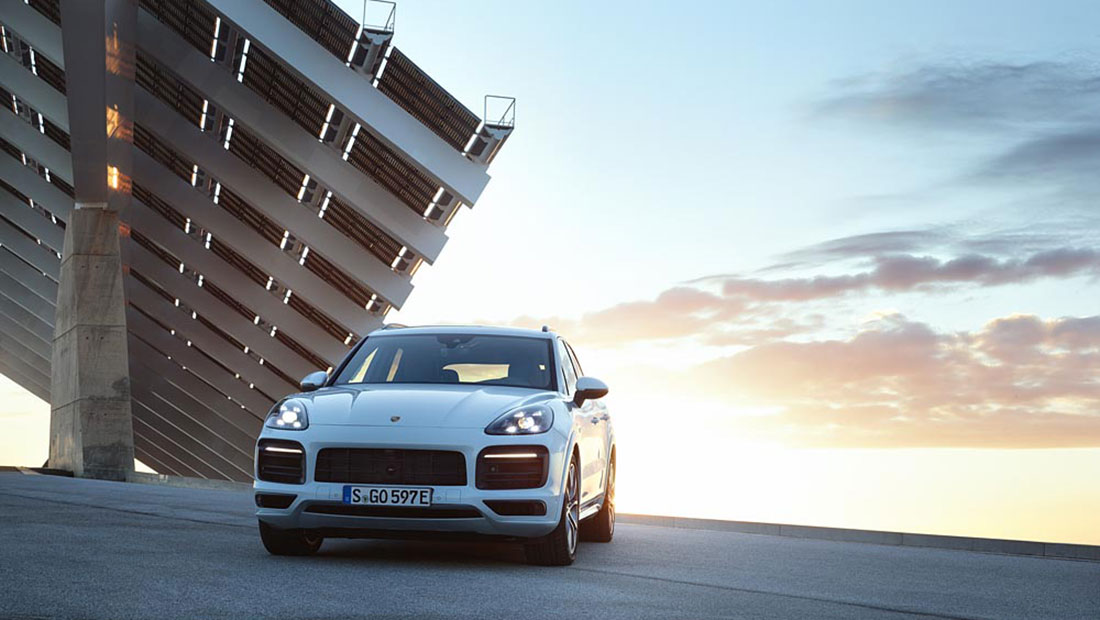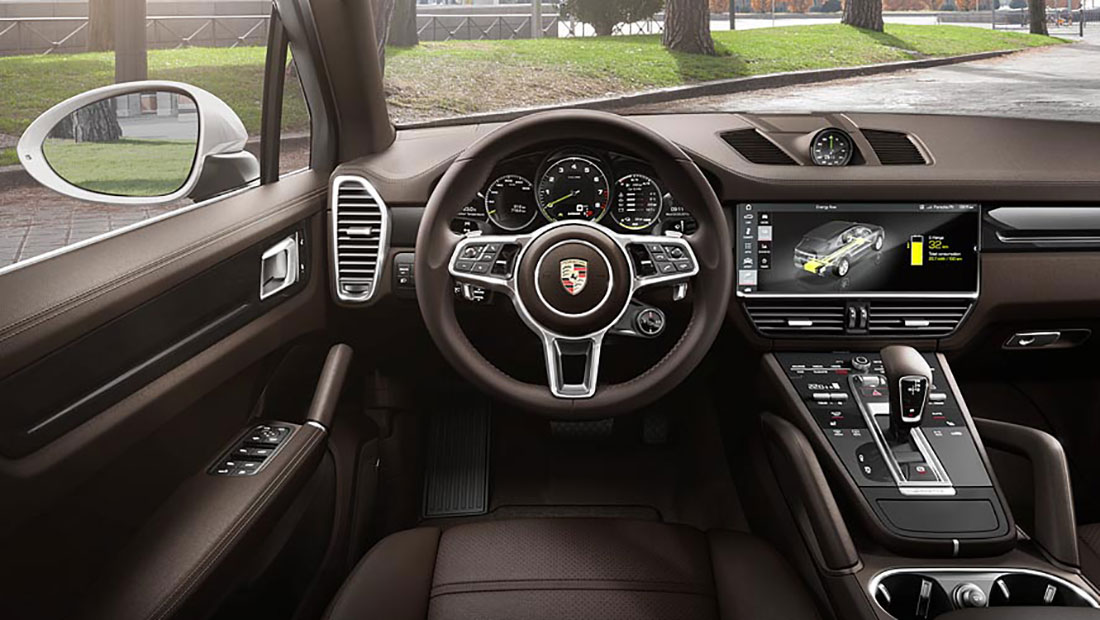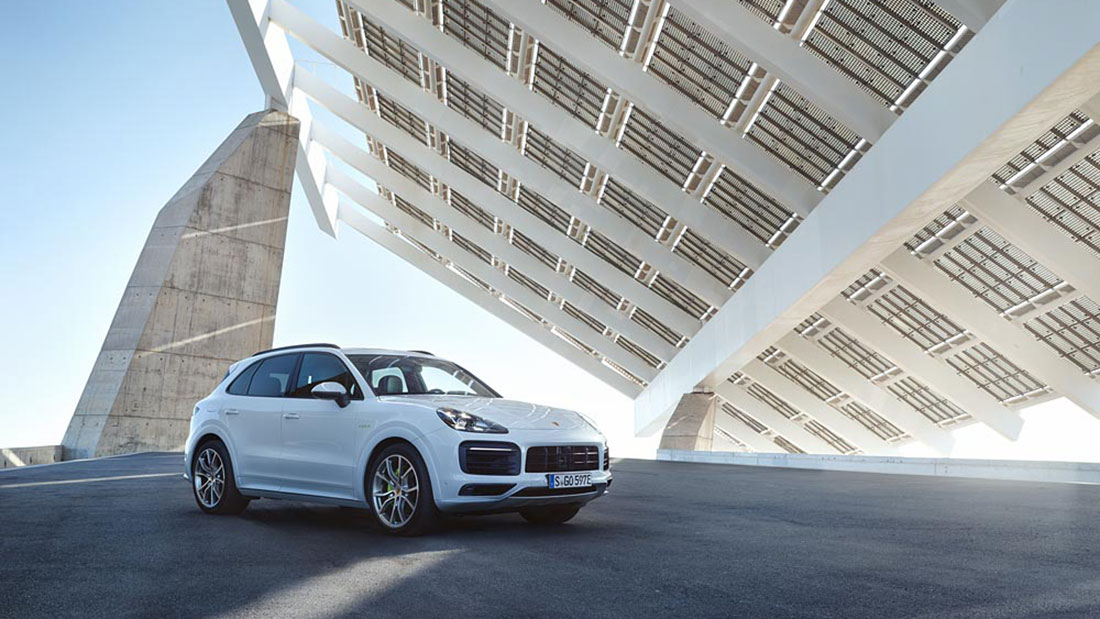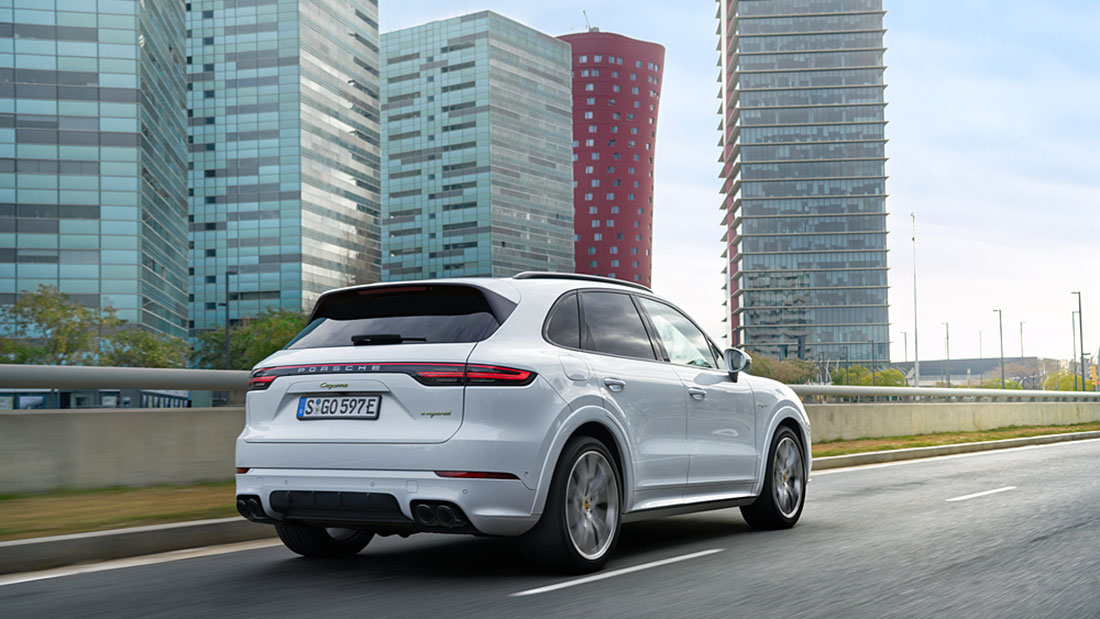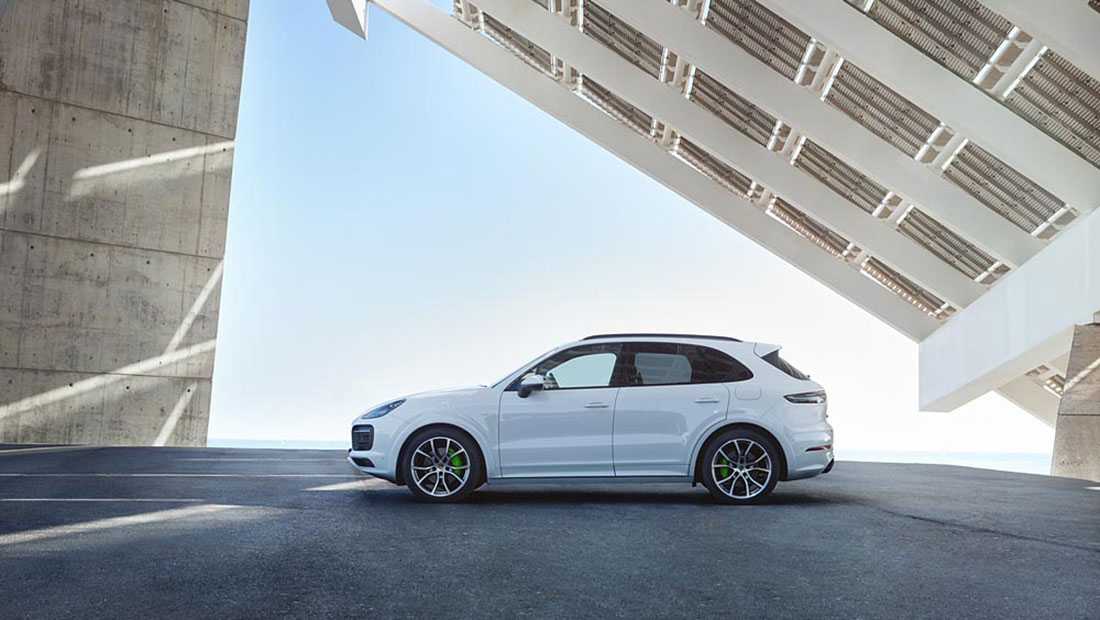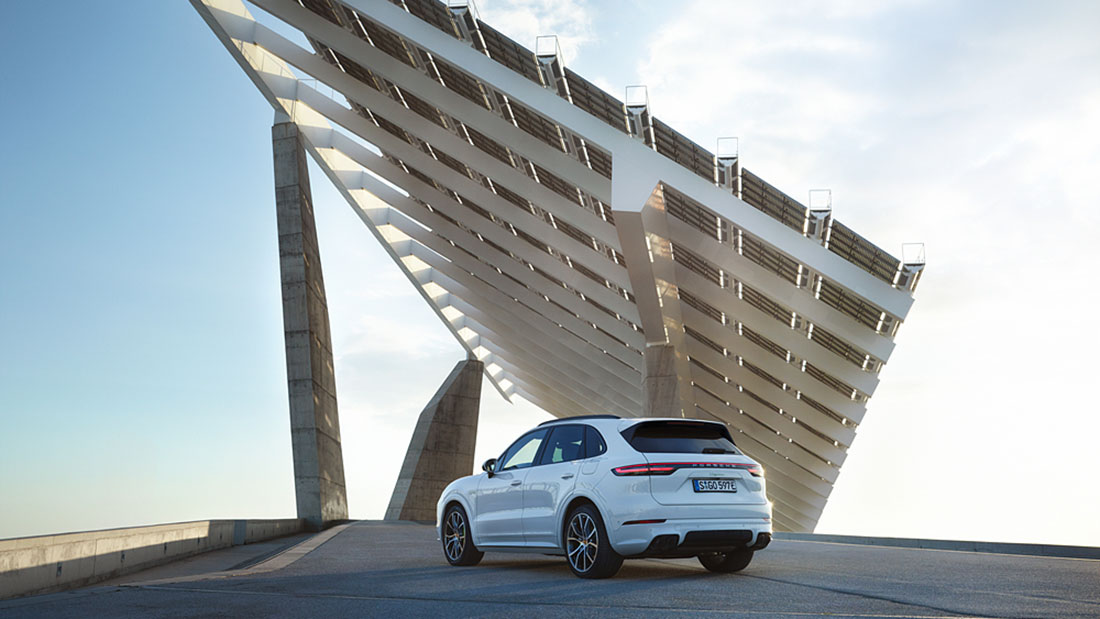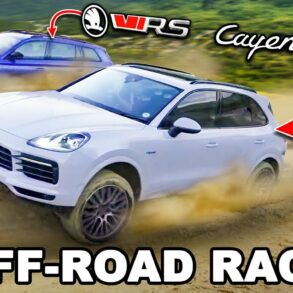Current Porsche Cayenne E-Hybrid – Ultimate Guide
The E-Hybrid version of the current Cayenne came in 2018. Porsche used the same platform as the Bentley Bentayga and the Lamborghini Urus for the third generation of the Cayenne. This platform was designed from the beginning to accept a hybrid version. It also featured a rear-axle steering system which really helps with low speed turning and cornering at speed.
At the front, the Cayenne E-Hybrid featured a continuous grille design, interrupted by three vertical slats. The turn-signals from the door-mirrors featured a dynamic light move thanks to the LED technology. On the side, the dynamic look was enhanced by the raked D-pillars and the roof-spoiler. In the back, two, wide, and chromed rectangular exhausts were placed under the bumper, in the apron. Like its predecessor, the 2018 Cayenne E-Hybrid featured green brake calipers visible through the 19” light-alloy wheels. Inside, the Cayenne E-Hybrid is very much the same interior as the rest of the Cayenne model range.
Porsche fitted the Cayenne E-Hybrid with a turbocharged 340 hp 3.0-liter V6 engine combined with a 136 hp electric motor for the drivetrain. Total combined power output reached 462 hp. The whole assembly was mated to an 8-speed automatic transmission that sent the power in all corners.
Pictures
Press Release
Porsche is continuing to implement its performance-focused hybrid strategy in the new Cayenne: with electrical engine performance enhanced by over 43 per cent and around 30 per cent more battery capacity in comparison to its predecessor, the new Porsche Cayenne E-Hybrid offers the best driving dynamics in its class and maximum efficiency. A powerful three-litre V6 engine (250 kW/340 hp) combines with a virtually silent electric engine (100 kW/136 hp) to generate system power of 340 kW (462 hp). The maximum torque of 700 Nm is already available just above the idling speed. The boost strategy matches that of the 918 Spyder supercar, just like in the new hybrid Panamera models. The Cayenne’s plug-in hybrid drive enables acceleration from 0 to 100 km/h in 5.0 seconds and a maximum speed of 253 km/h. The new Cayenne E-Hybrid can drive up to a distance of 44 kilometres and speed of 135 km/h on electricity alone, producing no local emissions. The average consumption of the all-wheeler in the New European Drive Cycle (NEDC), depending on the set of tyres used, is 3.4 – 3.2 l/100 km fuel and 20.9 – 20.6 kWh/100 km of electricity.
Alongside the launch of the Cayenne E-Hybrid, Porsche is expanding its range of comfort and assistance systems for the entire Cayenne series with additional innovative options. Accordingly, the list of available options now includes the new head-up display, the intelligent digital copilot Porsche InnoDrive including adaptive cruise control with active lane guidance, massage seats, the heated windscreen, independent heating with remote control and 22-inch light metal wheels. Remote Park Assist will be available in the next expansion phase. This package of new comfort and safety functions includes the ability to guide the Cayenne into a parking space or home garage using a smartphone.
462 hp system power with 918 Spyder boost concept
Porsche began pursuing electrification in its luxury SUV back in 2010: the Cayenne S Hybrid was the pioneer in its segment. In 2014, the Cayenne S E-Hybrid was another groundbreaker, with the introduction of plug-in hybrid technology. The next stage in the journey towards e-mobility is the new Porsche Cayenne E-Hybrid. While the performance of the combustion engine moderately improves on its predecessor by five kilowatts (7 hp), taking it to 250 kW (340 hp), the performance of the electric engine is now over 43 per cent higher, at 100 kW (136 hp). Both combine to produce a system power of 340 kW (462 hp), 34 kW (46 hp) higher than the car’s predecessor. The battery capacity also reaches a new level, enhancing the electric range and boost reserves too: in comparison to the previous model, capacity has risen from 10.8 kWh to 14.1 kWh. This is an increase of around 30 per cent.
The boost strategy based on the 918 Spyder supercar is another new addition. It ensures that the electric engine can be used in all driving modes for an additional performance boost. A system torque of 700 Nm is directly available when you press the accelerator pedal. The spontaneous responsiveness creates an impressive acceleration experience that’s unique to the segment. The Cayenne E-Hybrid hits 100 km/h in 5.0 seconds from a standing position. The SUV also reaches its maximum speed of 253 km/h with the combined forces of the combustion and electric engine in the Sport Chrono Package’s Sport Plus mode, available as standard. Depending on the driving situation and performance requirements, drivers can continue to draw on the boost torque across the entire range of speeds. This leads to a significantly more agile and superior driving experience.
The extent of the boost assistance and battery recharging depends on the driving mode. In the performance-focused Sport and Sport Plus modes, virtually all of the battery’s energy can be used for a boost. In Sport mode, the battery is charged just as much as is required for a new boost. In Sport Plus mode, the battery is recharged as quickly as possible. In the other modes, a limited amount of energy is available for boosting in order to support efficient driving.
Driving modes for sporty and efficient driving
The new Porsche Cayenne E-Hybrid is now better suited than ever to driving requirements. Its control system also has a range of different driving modes at its disposal for this purpose. The emphasis is on performance, highlighted by the fact that the Sport Chrono Package is fitted as standard. The driver can toggle between the four modes E-Power, Hybrid Auto, Sport and Sport Plus using the mode switch on the steering wheel. Pressing the Sport Response Button in the middle of the mode switch ramps up the car’s responsiveness for 20 seconds, ensuring an even more enhanced performance – for spontaneous overtaking, for example. E-Hold and E-Charge modes are also available. These can be activated via the Porsche Communication Management (PCM). The central console can also be used to activate the Individual driving mode for a custom configuration defined by the drivers themselves.
Electric driving with a range of up to 44 kilometres
The Cayenne E-Hybrid always starts in E-Power mode. This prioritises the electric driving experience. Accordingly, the electric engine and entire high voltage system provide the maximum performance of 100 kW (136 hp) and 400 Nm. The driver can adjust the interplay between the electric and combustion engines using a pressure point in the accelerator pedal produced by the control system. Up until this pressure point, the SUV runs purely on electricity. When the driver deliberately surpasses the pressure point, the combustion engine kicks in and provides the system’s full drive potential.
In E-Power mode, the E-Launch function is available when the battery is charged sufficiently: if the brake is pressed when stationary and the accelerator is held at the pressure point at the same time, the Porsche Cayenne E-Hybrid starts when the brake is released with maximum, electric-only acceleration. To allow the driver to monitor this function, the electronic instrument cluster displays its activation. In the electric-only E-Power mode, the new Cayenne E-Hybrid reaches a maximum speed of 135 km/h and a range of up to 44 kilometres (NEDC): if the battery’s charge status is below the minimum required for E-Power mode, the car automatically switches to Hybrid Auto mode.
Efficient driving in smart Hybrid Auto mode
The new smart Hybrid Auto mode enables the most efficient operation of the Cayenne E-Hybrid in city and intercity traffic. For the ideal combination of electric and combustion engines, the drive control calculates the optimum operating strategy based on driving profile, charge status, topology and speed information. Depending on these conditions, the system selects electric-only driving for situations where it makes most sense in terms of overall efficiency. When a destination is actively programmed into the navigation system, distance from the destination is also taken into account. Depending on the distance yet to be covered, the battery will charge efficiently at higher speeds by shifting the load point.
The driver decides: E-Hold and E-Charge
The driver can manually set the hybrid drive’s operating mode using the PCM’s Hybrid menu. There, the E-Hold and E-Charge functions can be selected directly as an alternative to Hybrid Auto mode. While the Hybrid Auto mode strives for the most efficient electric driving to minimise consumption, E-Hold mode ensures that the battery’s current charge status is deliberately maintained. This energy is then available at a later stage for electric driving or boosting. In the E-Charge mode, the battery is charged while driving using the combustion engine. By shifting the load point, the driver is able to increase the electric range in advance in order to use it in a specific way at a later stage, for example, in an urban environment.
Drives like a sports car: Sport and Sport Plus
The efficiency-focused E-Power and Hybrid Auto modes are only one side of the Porsche Cayenne E-Hybrid. The driver can experience the other side at the touch of a button in the performance-focused Sport and Sport Plus modes, thanks to the Sport Chrono Package available as standard. The Sport mode offers the classic features of a Porsche car for speedy journeys on roads and motorways. The drive and chassis switch to a sporty setting. The battery’s charge status is kept to a minimum level required to provide sufficient boost potential for sports driving at any time. In Sport Plus, the focus is on maximum sports performance. The drive and chassis are in a performance setting. In the Cayenne E-Hybrid, the Sport Plus also differs from the Sport mode in that the battery charges faster. This enables more frequent boosting for longer. In both modes, the combustion engine remains in operation. In Sport Plus mode, the Porsche Cayenne E-Hybrid reaches its maximum speed of 253 km/h.
New hybrid model for high power density and spontaneous responsiveness
The Cayenne E-Hybrid is a parallel hybrid in which the electric and combustion engines both directly impact the drive train. A new, performance-focused V6 engine with 3.0 litre cylinder capacity and turbocharging acts as a combustion engine. This engine is combined with a new permanent-magnet synchronous motor. Based on the Porsche 918 Spyder, the electric engine has been converted from an internal rotor to an external rotor architecture. The idle, fluid-cooled stator is therefore encircled by the moving rotor. The advantages of the new engine: enhanced power density, improved effectiveness and good controllability for spontaneous responsiveness. The new hybrid module consists of a highly-integrated combination of electric engine and separating clutch. In contrast to the previous electro-hydraulic system with the spindle actuator, the separating clutch is operated electromechanically, which ensures even faster reaction times.
New battery with 30 per cent more capacity
The battery in the Cayenne E-Hybrid demonstrates the advances in storage technology: Despite storing around 30 per cent more energy, at 14.1 kWh, the battery is no heavier, at 138 kilograms. A specific charging strategy avoids deep discharge, guaranteeing a long lifespan. This means that the car can still be started electrically after it has been stationary for long periods.
The fluid-cooled battery is stored beneath the loading floor in the rear of the car and consists of eight cell modules with 13 prismatic lithium ion cells each. The cell anodes are optimised for high currents during boosting and recuperation. At the same time, the cell capacity was increased by an optimised cell structure and an improvement in cell chemistry on the previous model, from 24 Ah to 37 Ah.
The plug-in charging system includes a new connection that’s even easier to use. The charging key module shows the current status via an LED and allows the driver to switch between timed and immediate charging at the touch of a button. The timer can be programmed for time-shifted charging via the PCM or the Porsche Connect app. Charging times themselves vary depending on the on-board charger and electricity source. The fastest way for energy to pass through is with a high-voltage connection in combination with the optional 7.2 kW on-board charger. A 3.6 kW on-board charger is fitted as standard. The optional charging cable (mode 3) also allows the Porsche Cayenne E-Hybrid to be charged at public charging stations.
New eight-speed Tiptronic S and controlled Porsche Traction Management (PTM)
Porsche has redesigned the Cayenne E-Hybrid’s drive train. The new Tiptronic S, developed for the entire Cayenne range with eight speeds, is responsible for transmission. The automatic gearbox not only offers even more comfortable and smoother starting but also significantly speeds up switching. Interruption of tractive force during the switching processes has also been further reduced.
The Cayenne E-Hybrid has an active hang-on all-wheel drive with an electronically regulated, map-controlled multiplate clutch. With its broad range of torque distribution, Porsche Traction Management (PTM) offers clear benefits in terms of driving dynamics, agility, traction control and offroad capabilities.
Chassis and brakes with all Cayenne options
With the brand new chassis, Porsche Cayenne E-Hybrid offers the same sports car driving dynamics as all other models of the new Cayenne generation. Porsche Active Suspension Management (PASM) is available as standard. For the first time, a hybrid model is also available with the Porsche Dynamic Chassis Control (PDCC) as an option, as well as the trailer fitting for loads up to 3.5 tons.
The Cayenne E-Hybrid is fitted with a grey cast iron brake system as standard. In keeping with Porsche’s colour scheme, the brake calipers are acid green, but are also available in black. The new Porsche Surface Coated Brake (PSCB) is also available with brake calipers in acid green or an optional white. The Porsche Ceramic Composite Brake (PCCB), tried and tested on racetracks, is also available. The brake calipers are available in acid green or an optional yellow.
New hybrid-specific display and control design
The Cayenne E-Hybrid’s display and control design has been completely reworked and is broadly similar to that of the 918 Spyder. The most remarkable feature is the standard Sport Chrono Package’s mode switch, which allows different driving modes to be selected directly on the steering wheel. Even the hybrid-specific displays on the electronic instrument cluster were based on those of the 918 Spyder in terms of their functionality. The central Power Meter provides information on the energy currently being used or recovered, while the Boost Assistant gives details of the available electrical energy for boosting. The Hybrid assistant helps dispense electric drive power, helps visualise the point at which the combustion engine kicks in and also shows the remaining electric range calculated. The new PCM’s 12.3-inch touch display offers additional information in the Hybrid menu. This allows the driver to view the current energy flow, consumption values, remaining electric range and emissions-free driving sections.
Standard independent climate control: heating and cooling with pre-selection
The new Porsche Cayenne E-Hybrid combines classic Porsche performance with even more comfort. Independent climate control is now available as standard. The option of pre-conditioning is new. This allows the interior of the car to be heated or cooled before driving without starting the combustion engine. Both functions can be managed or programmed via the PCM or the Porsche Connect app. In winter, the windows can therefore be cleared of ice and snow before driving. Drivers and passengers can then climb into a car with comfortable interior temperatures. The same comfortable experience is offered by the cooling function, which can be used to precondition the SUV, for example, in summer, when the sun shines for long periods. Furthermore, the optional four-zone automated climate control system is now available for the first time for the Cayenne E-Hybrid. This allows the occupants of the car to individually adjust the temperature distribution to their own needs. Optional rear seat ventilation is also offered for the first time in the new Cayenne E-Hybrid.
Expanded functions: Porsche Connect and Porsche Charging Service
Porsche Connect offers the customer a range of options to help them connect more with their Porsche. It can be used, for example, to view car information remotely and to control selected functions via the app too. The Porsche Connect app displays the electric-only and the overall range, the battery’s current charge status and the remaining charging time. It can even be used to operate the independent climate control, i.e. the heating and cooling of the car when the ignition is switched off. Charging stations can be found, filtered and set as a navigation destination.
The new Porsche Charging Service also makes it easier to use public charging infrastructure (AC and DC charging stations) without having to register with the relevant provider too – even across states (not yet available in all states). This is billed directly via the Porsche ID account and a single unit price per state is guaranteed at all connected charging stations based on the charging power in question. The customer can view the desired charging station on the PCM or smartphone app and add it to the navigation. The service also offers real-time information on available charging stations, the required charging plug type and the charging power.
New options: head-up display and 22-inch light metal wheelsCayenne with new assistance systems, functions and feature details
Alongside the launch of the Porsche Cayenne E-Hybrid, Porsche is expanding its range of assistance systems and optional features for the entire series with a variety of innovations. For the first time, head-up display is available in a Porsche. It projects all the relevant driving information directly into the driver’s line of vision in a full-colour display. The system therefore significantly reduces distractions for the driver. Other features now available in the Cayenne are the smart digital copilot Porsche InnoDrive with adaptive cruise control and active lane guidance, massage seats, a heated windscreen, independent heating with remote operation and 22-inch light metal wheels.
First Porsche head-up display
Porsche’s first head-up display can be found in the new Cayenne. The system generates a graphic display that appears to the driver as if around 2.3 metres away and is split into seven sections. The height, brightness and angle of the display can be adjusted via the PCM. Depending on how the car is equipped, the driver can choose between up to four presets in which different driving information can be displayed based on preselection. The standard view provides information on activities and the status of the assistance systems. This allows recognised and currently applicable road signs to be displayed, for example, and navigation information to be presented when heading to a specific destination. In connection with the Sport Chrono Package, the relevant preset provides dynamic driving information such as speed, lap time and lap number. When the Sport Response function is activated, the driver can see the remaining function time in the head-up display. The Offroad preset, in conjunction with the optional Offroad package (not available for Cayenne E-Hybrid), provides the driver with information on side tilting, steering movement, incline and Hill Descent Control. The fourth preset in the user-defined display allows the user to create their own individual configuration from the individual display features via the PCM. Irrespective of the preset selected, the system displays information relevant to the situation. Accordingly, for example, when the car is at risk of a collision, a large warning symbol is displayed. Relevant symbols are displayed for incoming calls or when voice commands are activated.
Exclusive to the Cayenne: the Offroad Precision app
With the new Offroad Precision app, Porsche gives the Cayenne driver the opportunity to document, evaluate and improve their trips on terrain. The ‘Trip’ section works in a similar way to popular running apps for mobile phones. If recording is activated, all relevant data is collected automatically: driver, car, route, times and GPS data. These are used to automatically create route and elevation profiles that can later be viewed on a map. At the same time, the journey can be recorded in its entirety as a video, using either a smartphone or an externally controlled action cam. The smartphone’s ‘sharing’ function allows the trips to be shared on social networks. In the app mode ‘Personal progress’, the driver’s individual performance is assessed with a bonus system. The app also provides the offroad newbie with sound basic knowledge explaining how to get around in a Cayenne on terrain. The tutorial is completed by an overview of offroad parks where you enjoy your first forays in a safe environment. The Offroad Precision app is available for iOS and Android.
More comfort, more value: independent heating, massage seats, load compartment management
The expanded range of features for the Cayenne now includes a heated windscreen and a programmable independent heating with remote control and Porsche Connect connection. The new massage function for the optional comfort seats in front (14-way, electric) enhances not just comfort, but also the condition. Drivers and passengers can choose between five massage programmes performed by ten pneumatic massage pads in the seat backs. This not only provides added comfort when seated but also helps promote muscle activation and relaxation on long journeys. The new load compartment management also includes two attachment rails integrated into the load compartment floor, a telescopic rod, lashing eyes and a luggage area partition net.
New sports options
For sports-focused Cayenne drivers, Porsche is expanding its range of options to include new wheel designs – the 21-inch Cayenne Exclusive Design wheel and the 22-inch Cayenne Sport Classic wheel. The new 21-inch Porsche Cayenne E-Hybrid Design wheel is available exclusively for the Porsche Cayenne E-Hybrid. The new sport exhaust system creates dynamics you can experience acoustically. It generates an especially powerful sound experience in the Sport and Sport Plus modes in particular. The high-gloss double sport exhaust pipes in the exhaust system are available in silver or black. The Sport Design Package gives the new Cayenne models an even more sporty look. The stand-alone components in exterior colour ensure an even more unique appearance.
InnoDrive: an electronic copilot
The new Porsche InnoDrive, including adaptive cruise control, is exceptionally future-forward: the optimum acceleration and deceleration values are calculated for the next three kilometres using navigation data and activated via the engine, the Tiptronic S and the brake system. As part of this process, the electronic copilot takes into account curves, inclines and speed limits automatically. Current traffic conditions are captured by a radar and video sensor and arrangements are adapted accordingly. Developed exclusively by Porsche, InnoDrive improves efficiency. Car functions such as coasting, deceleration cut-off and braking are controlled in a more consumption-efficient way based on predictive navigation data.
Porsche InnoDrive also offers clear benefits in terms of comfort and dynamics. The system even recognises roundabouts and adapts the speed to existing conditions. When Sport mode is activated, InnoDrive also switches into a more dynamic approach. The integrated adaptive cruise control helps the radar and video sensor record the distance from the cars in front and adapts it on an ongoing basis. The active lane guidance permits assisted driving on well-developed roads and motorways (in a speed range of zero to 210 km/h). The system drives the car with light steering interventions and follows the line of cars ahead within system limits. It bases its approach on road markings and other cars on the road.
Sound world 1: BOSE® Surround Sound System
The Cayenne Turbo is fitted as standard with the new BOSE® surround sound system, optionally available for other models. With 14 speakers, including subwoofer, 14 amplifier channels and a total output of 710 watts, this system offers authentic sound in all five seats. With its Centerpoint® 2 technology, stereo tracks can be replicated in surround mode. This creates impressive acoustics. The AudioPilot® noise compensation technology ensures the audio experience can be enjoyed irrespective of the driving situation. The innovative BOSE® SoundTrue enhancement technology replicates parts of music files lost in compression, such as in MP3 format, thus enhancing sound quality and dynamics.
Sound world 2: Burmester® 3D High-End Surround Sound System
The new Burmester® 3D high-end surround sound system with the new Auro 3D® algorithm offers yet another enhancement. This system creates a realistic concert hall atmosphere in the car’s interior. It includes 21 speakers with a two-way centre system and an active subwoofer with 400-watt Class D digital amplifiers. The entire output is 1,455 watts. The enhanced high end system offers exclusive technologies such as the Burmester® air motion transformer and the Sound Enhancer®. When listening to data-compressed music files, the sound can be enhanced even further using the Sound Enhancer®. The Auro 3D® algorithm is revolutionising the audio experience in the entire automotive sector. In collaboration with Galaxy Studios, renowned worldwide for perfect music reproduction, a special algorithm was developed that creates a perfect 3D impression in music reproduction. The Auro 3D® technology can help create a dynamic 3D audio experience from any source material.
Function package: Remote Park Assist for independent parking
With the new Remote Park Assist, Porsche has put together a comprehensive optional package of comfort and safety functions for the Cayenne which will be available for the new Cayenne generation in the next expansion phase. The driver can not only leave parking to the SUV, but also gets help in manoeuvring the vehicle and is warned of hazard situations when disembarking and leaving the parking space.
Active parking assistance makes parking much easier. With the help of the car’s ultrasound and camera systems, the system automatically recognises parking spaces and measures their size. Once the system has signalled that the space is big enough, the driver can press and hold the button on the central console to begin and control the parking process. The system takes over the steering and chooses the speed itself and controls the accelerator and brake automatically. All the driver needs to do is monitor the process. The active parking assistance is able to park the car in horizontal and diagonal parking spaces.
Park Pilot goes a step further, allowing the driver to bring the car in and out of parking spaces via remote control using a smartphone. Once the system has identified a suitable parking space, the driver can initiate parking by pressing the relevant PCM button before disembarking. The parking process is then continued by continuing to press the button on the smartphone app. The garage pilot works according to the same principle and is used when the car is being parked or brought out of a narrow garage without requiring the driver to stay inside the car. Once the Cayenne reaches its endpoint, the engine and ignition are automatically switched off and the car is locked. The garage pilot can also bring the car out of parking spaces. To make this happen, the driver starts the SUV with the smartphone app and lets it emerge for long enough until he can climb in comfortably.
3D Surround View display creates a comprehensive overview
The system also helps drivers manoeuvre by themselves. Remote Park Assist’s 3D Surround View display calculates a 360° view using four individual cameras to help with entering and leaving parking spaces and manoeuvring the car. One of the system’s major innovations is the perspective-based, three-dimensional display. The manoeuvring assistant with its kerb alert helps prevent collisions in narrow manoeuvring situations where visibility is poor. The function is triggered automatically at speeds up to 10 km/h and displays the parking situation in 3D on the PCM’s touch display. If there is a risk of a collision, there is a warning display on the PCM and, where necessary, a steering boost.
Trailer manoeuvre assistance steers car itself when towing
If the Cayenne is being used for towing, the trailer manoeuvre assistance makes reverse parking much easier. Once the function is activated, all the driver needs to do is simply put the vehicle in reverse and accelerate gently. They can use the PCM’s rotary adjuster to continually adjust the angle they would like to place the car in themselves. The image from the reverse camera on the PCM provides appropriate guide lines for orientation. The system activates the steering wheel itself and steers the trailer on the course selected by the driver.
Warning functions when disembarking and exiting a parking space
Two warning functions that enhance everyday safety significantly complete the package. The disembark warning indicates when cars are approaching from the rear as the door is opened. LEDs flash red in the interior door handles. The disembark warning remains in operation for another three minutes after the ignition is switched off. The function is also based on the sensors in the rear radar, like the exit warning. When parking assistance is activated, this gives a warning of other cars recognised as critical as the car emerges from a diagonal parking space, for example. The warning occurs on different levels – visually on the PCM display, acoustically and, where necessary, by brake shuddering.


